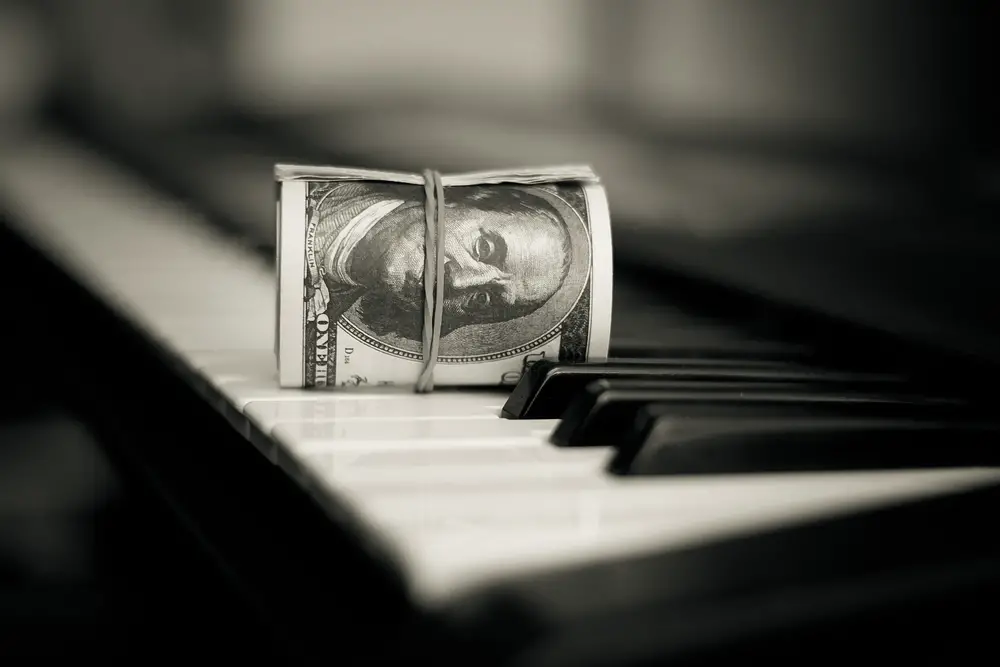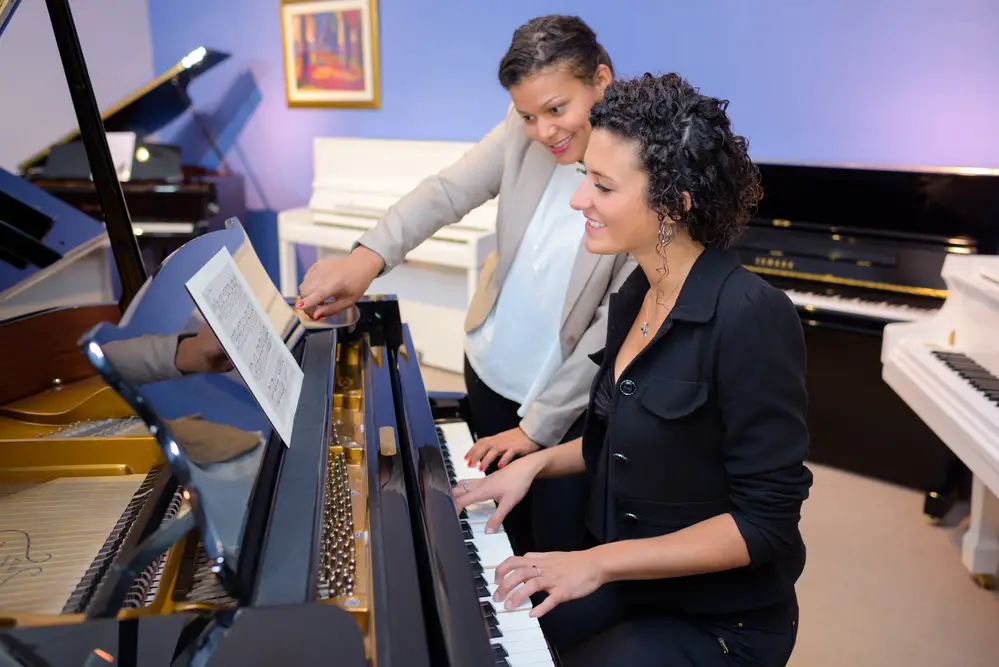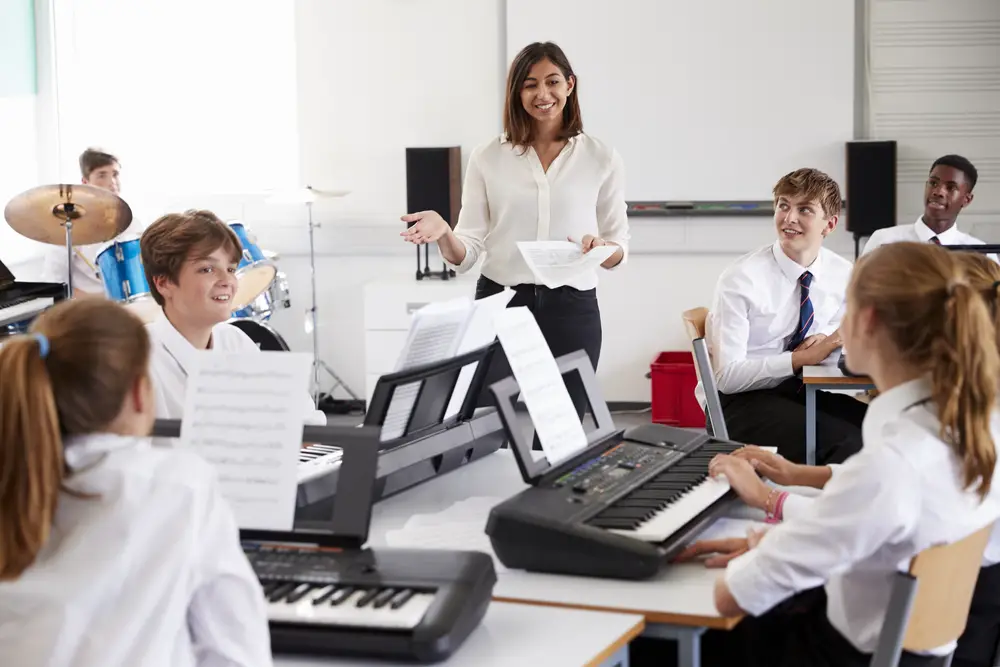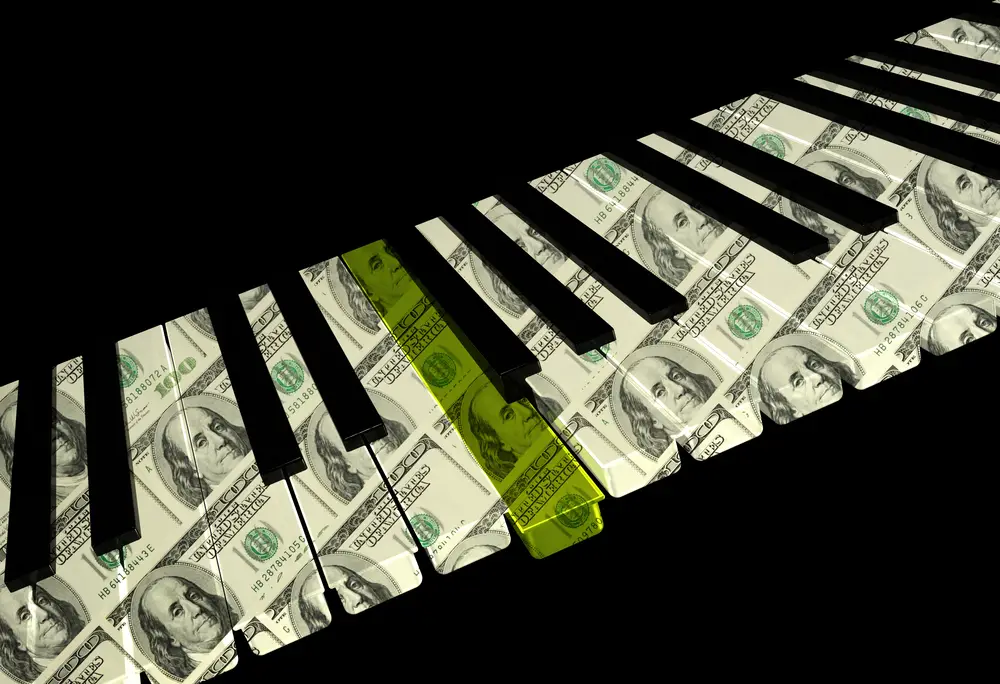
When it comes to taking piano lessons, there are many excellent avenues you can choose. You may have some questions like “How much are piano lessons?” or “What types of lessons could I take?”
Table of Contents
- Private Piano Lessons
- Cheap Private Piano Lessons
- Expensive Private Piano Lessons
- Group Piano Lessons
- Private Lessons in a Home Studio
- Hidden Costs of Piano Lessons
Before spending money on piano lessons, it’s always good to research and see if they’re really worth it for you.
Let’s dive right into the different types of piano lessons, along with piano lesson costs.
Private Piano Lessons

Private piano lessons are arguably the most common lesson type. Some people and places that offer private lessons are colleges, music stores, music studios, and independent teachers. In the U.S., the average cost for a 1-hour private piano lesson is $50.
Private lessons can take place in music buildings, institutions, and homes. Home lessons are much different than the rest, but I’ll discuss those in a bit. In the United States, a 1-hour piano lesson costs $50 on average. You may be able to find them for as low as $40 or as expensive as $100. You may wonder, “What’s the difference between cheap and expensive piano lessons?”
Cheap Private Piano Lessons
If you go for cheaper private lessons at $40-50 per hour, there are some things you should expect. Piano teachers with these rates are usually younger and less experienced than the expensive teachers. This pool also includes recreational pianists and college music students. A lower price doesn’t necessarily mean a teacher is sub-par, but they likely don’t have decades of experience.
For some people, taking cheaper piano lessons may be the best option. You could argue that no matter the teacher, one can only learn to play so fast. Though higher-priced lessons can be rewarding, you may only see slightly more improvement compared to cheaper lessons. This fact alone may turn many people away from costly lessons, especially those with tight budgets. If you’re looking for a personalized experience, cheaper lessons might actually be better. Less experienced teachers may not have a wide variety of students to focus on, allowing them to concentrate more on you.
Though cheaper piano lessons are easier on the wallet, they still have some disadvantages. Since the teacher may be young and without broad teaching experience, they might not be very organized. Rather than having you stick to a strict practice regimen, they may let things slide and improvise the lessons on the spot. That’s not all bad for some people, though, especially if you are looking for a laid-back experience. Another disadvantage of cheap lessons is not knowing if the teacher is really proficient on the piano themself. These teachers might not have the years of experience to back up their credentials. So, depending on the teacher, cheap piano lessons can be valuable or invaluable.
Expensive Private Piano Lessons
Piano lessons that are $70 and higher per hour generally come with a highly experienced or acclaimed teacher. Private lessons with these teachers have many advantages and disadvantages. For one thing, the teacher has probably taught hundreds of students and has developed excellent, personalized teaching methods. A higher price also shows that the teacher is fully committed rather than a side teacher.
One disadvantage of taking expensive lessons is a lack of personalization. The teacher likely has a full schedule of over 20 students per week. Since they teach so many lessons, they may not fully invest themselves with your progress. If you’re going to pay upwards of $2000-3000 per year, there better be superb personalization from the teacher.
Group Piano Lessons

Group piano lessons are much different than private lessons. Instead of being 1-on-1 with the teacher, you’re in a class with up to 15 students and one teacher. Also, you pay by the month rather than every lesson. Group piano lessons cost anywhere from $25-60 per month, which is much cheaper than private lessons. The reason for this massive price difference lies in how many people there are. In general, the smaller the class, the more expensive it is. The teacher’s experience level also plays a role in cost. Because the class is full of people, you don’t get the same amount of attention as in a private lesson.
Though group piano lessons don’t give you as much 1-on-1 help, they still have some benefits. As you listen to others playing around you, your musical ear can develop over time. Group piano teachers often play something for students to repeat, which boosts ear training. You also learn to play as an ensemble, or in simpler terms, a team. Rather than ultra-focusing on learning individual pieces, you go through lots of songs with the whole class. If you have a tight budget, group lessons aren’t nearly as harsh on the wallet.
Of course, there are some downsides to group piano lessons. As I mentioned, you don’t get as much personal attention as in private lessons. Instead of focusing on your progress, the goal is to make the class better as a whole. So, those who excel and those who struggle are disadvantaged by the class not moving their speed.
You can find group piano lessons for kids, college students, and adults. Most colleges have them for anyone to take. Adult group lessons are usually more laid back and considered as a pastime or hobby. For adults, it’s common for classes to be relaxed with flexible decision-making.
Private Lessons in a Home Studio

Though they’re a type of private lesson, home studio lessons are a different breed. They take place in a teacher’s personal studio rather than an institution. Teachers often charge the same or a little less than in an institution. Under a contractor such as a music store, teachers get a percentage of the pay, but they keep the full payment from home studios.
The advantages of taking lessons in a home studio are plenty. Firstly, the environment is a lot more comfortable. Instead of being under dull, white lights in an office studio, you often have warm lighting and furniture in teachers’ studios. Sometimes taking lessons can be nerve-racking, but the comfortability of being in a home helps relieve anxiety. The level of personalization in lessons is also high. You and the teacher have more of an opportunity to get to know each other, which can give you more motivation to practice. Without a defined curriculum, the teacher may also want to help you reach your goals instead of their goals.
One possible downside of taking home lessons is cheaper equipment. Some teachers don’t have the quality of pianos you might find in a music building. On the other hand, some teachers have just as good, if not better pianos than institutions. Before choosing a home studio teacher, it’s always good to visit their studio first.
Hidden Costs of Piano Lessons

Sometimes it’s tempting to look for the most affordable piano lessons you can find. However, that’s not always the best idea. If a teacher charges $60 per hour, that means their half-hour rate is $30. When looking for a teacher, you’ll come across both of these prices, and it’s important to understand the difference. So, instead of hunting for the lowest price, look for a quality teacher.
Another hidden cost of piano lessons isn’t actually the money, but the time commitment. Learning to play the piano doesn’t happen overnight, and it requires a certain amount of dedication on your part. After 10 lessons, there’s no guarantee you’ll see improvement because progress depends on how much you practice. It’s difficult for some people to understand the time and dedication it takes to improve with lessons.
An important question to ask yourself is, “What are my goals?” If you’re serious about learning making strides, piano lessons might be the ticket. On the other hand, if you don’t have the time to practice, you could lose a lot of money by taking piano lessons.
Let’s say you spend $50 a week for a 1-hour lesson. Weeks are going by, and you feel like you’re not improving because you don’t have the time. By the end of the year, you’ve just wasted around $2,000 without much in return. Since you pay for lessons weekly, you may not realize how much it adds up in a year.
Before getting into lessons, ask the teacher things like, “How much will I improve?” and, “How am I going to get there?” Without these questions, the teacher might not help you reach your goals. Piano lessons aren’t worth it unless you improve in the style of your choice. For example, if you want to learn to play classical piano, you’re not going to benefit from a jazz teacher and vice versa.
Figure out where you want your skills to be, then decide how much you’re willing to pay to get there. Piano lessons can be valuable if you put in the time and effort. Find the right teacher and the right setting, whether it’s private or group lessons. Just be sure to evaluate all of the hidden costs before investing in anything long-term.
